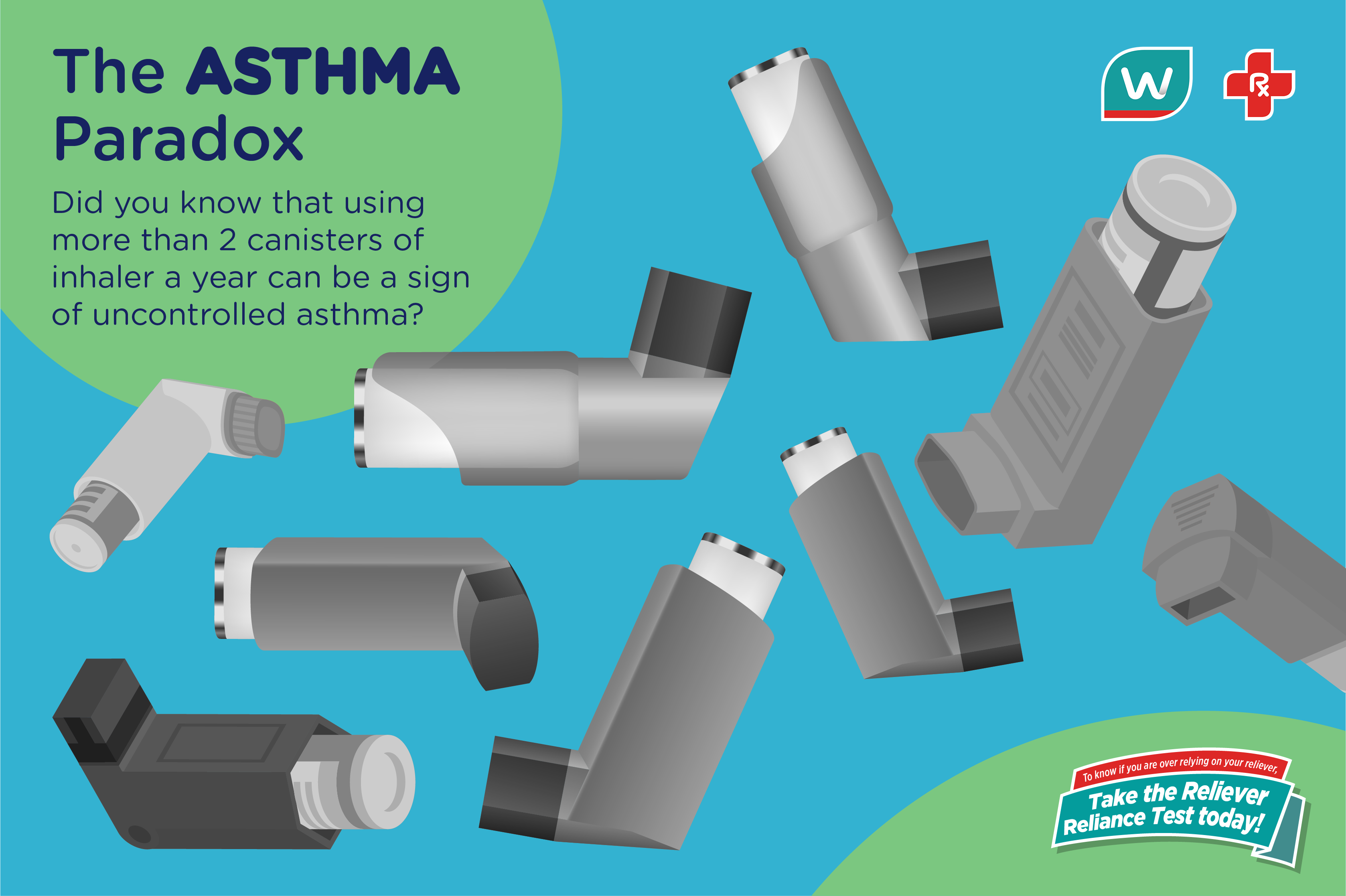
Asthma can affect one’s daily life. Understanding what it is, and the signs of poorly controlled asthma can help you keep it under control. This article will help you recognize poorly controlled asthma with the help of a simple questionnaire called Reliever Reliance Test.
Contrary to what you may think, the frequent use of relievers does not signify a well-controlled asthma. Using it too often or finishing more than 2 inhalers a year can be a sign of poorly controlled asthma.4 If you happen to use more than 2 canisters a year, take the Reliever Reliance Test and visit your doctor for an updated asthma care plan.
The Reliever Reliance Test or RRT is a simple and reliable tool to know if you are over-using your short-acting beta agonist (SABA) inhaler or reliever. A 5-item questionnaire designed by leading experts in behavioral medicine, Prof. Robe Horne, UCL.5 It is globally endorsed by IPCRG & Asthma Right care and locally endorsed by the Philippine College of Chest Physicians (PCCP).
To know if you are over relying on your short-acting beta agonist (SABA) or reliever — take the Reliever Reliance Test. Scan the QR code below or click here.
Asthma affects 339 million people, and the Philippines ranks second with the greatest number of deaths caused by asthma.1
Asthma is a condition that affects the lungs. When you have asthma, your airways get inflamed making it hard for you to breathe. It is a chronic or long-term condition, which means it cannot be cured. Despite being a chronic condition, proper management can help prevent symptoms and reduce asthma attacks so you can live a normal life.
Asthma symptoms differ with every patient but among the common symptoms are2:
One of the things you can do to manage your condition is to know your triggers and avoid them. Among the common triggers of asthma are:
Your doctor may prescribe medications to help manage your asthma. You need a bronchodilator, considered as relievers, such as short-acting beta-agonists (SABA) and long-acting beta-agonists (LABA) to get relief and to control breathlessness. In the Philippines, the widely used reliever is Salbutamol. You will also need inhaled corticosteroids (ICS), also called controllers, like fluticasone and budesonide to address inflammation. Corticosteroids are used together with a bronchodilator known as ICS LABA for maintenance.3
References: 1 http://globalasthmareport.org/resources/Global_Asthma_Report_2018.pdf 2 https://www.who.int/news-room/-fact-sheets/detail/asthma 3 https://www.ncbi.nlm.nih.gov/books/NBK279519/ 4 Nwaru, B., Ekstrom, M., Hasvold, P., Wiklunkd, F., Telg, G. and Janson, C., 2020. “Overuse of short-acting β2-agonists in asthma is associated with increased risk of exacerbation and mortality: a nationwide cohort study of the global SABINA programme.” European Respiratory Journal, 55(4), p.1901872. Available from https://erj.ersjournals.com/con.../erj/55/4/1901872.full.pdf 5 Developed by leading expert in behavioural medicine, Professor Rob Horne, University College London (UCL), with colleagues from the International Primary Care Respiratory Group (IPCRG), and fully funded by AstraZeneca UK Limited. Locally endorsed by the Philippine College of Chest Physicians (PCCP)
Blood pressure (BP) is the pressure exerted by the blood as it pushes against the walls of our arteries, which […]
Overweight and obesity are defined as abnormal or excessive fat accumulation that presents a risk to health. A body mass […]
Around 27 million Filipino adults are overweight or obese, according to the latest National Nutrition Survey conducted by the Food […]